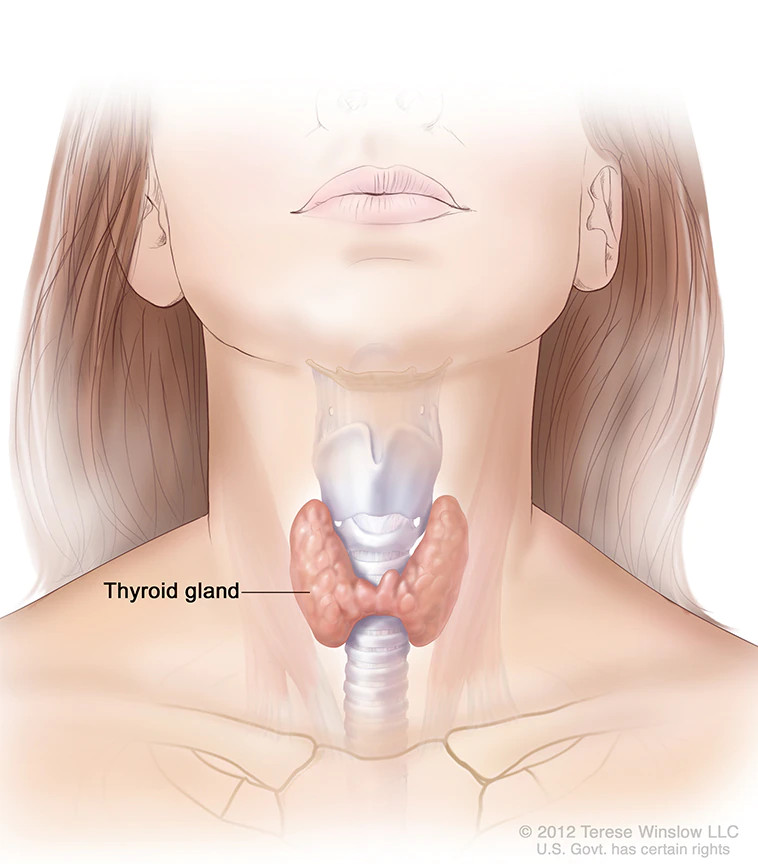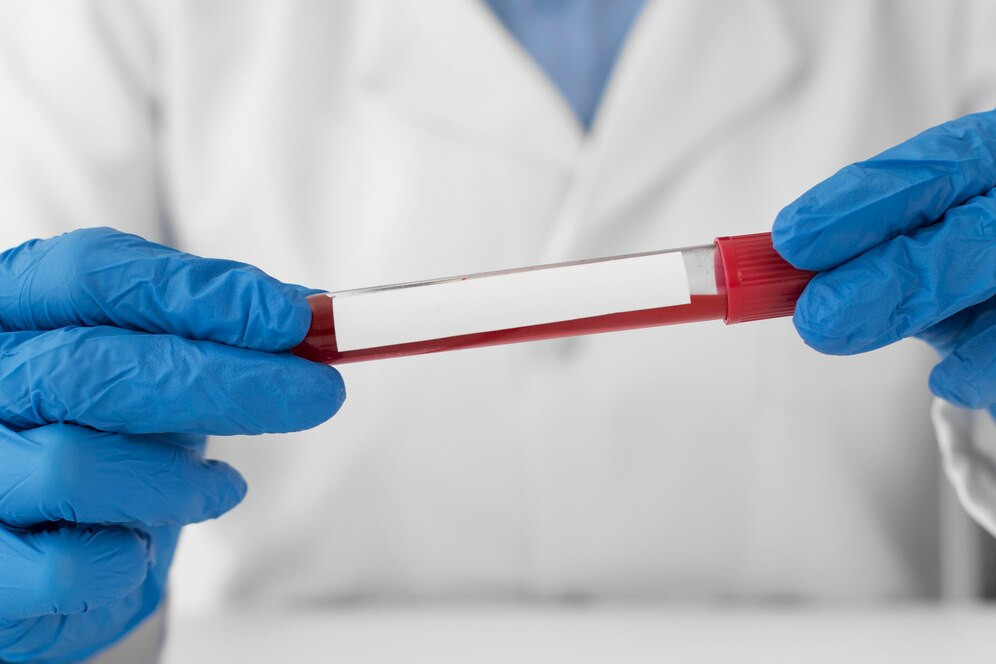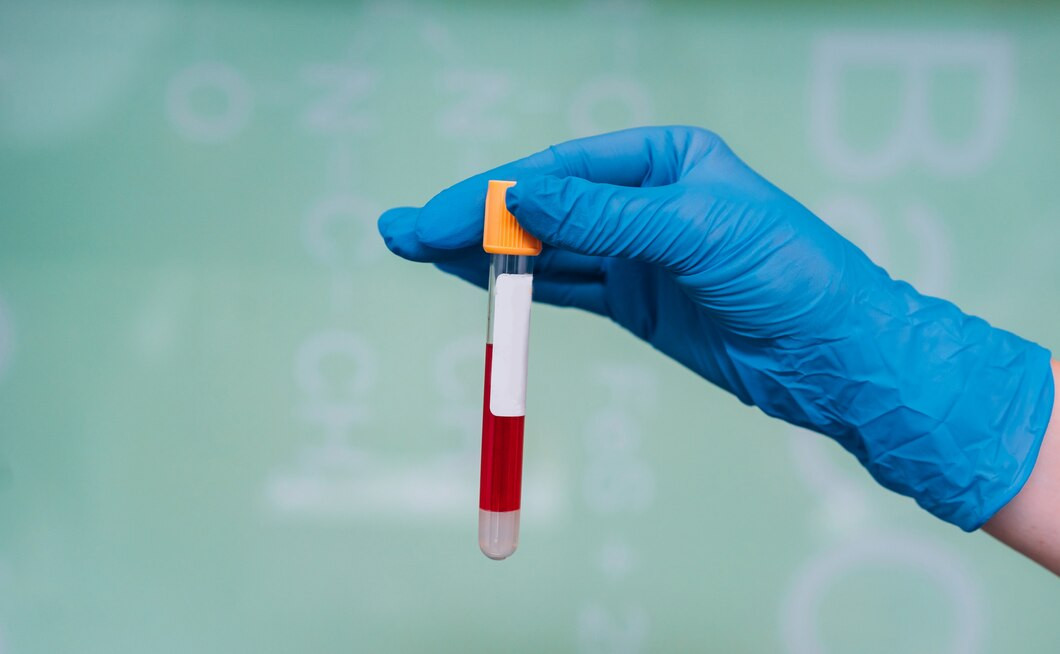Definisi
Hipotiroidisme adalah suatu kondisi dimana kelenjar tiroid tidak memproduksi cukup hormon tiroid yang dibutuhkan tubuh. Tiroid adalah kelenjar berukuran kecil dan berbentuk seperti kupu-kupu yang terletak di bagian depan leher Anda. Hormon tiroid mengatur bagaimana tubuh menggunakan energi serta metabolisme, sehingga hormon ini mempengaruhi hamper setiap organ di tubuh Anda, bahkan mempengaruhi detak jantung Anda juga. Tanpa hormon tiroid yang cukup, banyak fungsi tubuh akan mengalami perlambatan.
Penyebab
Hipotiroidisme memiliki beberapa penyebab, seperti:
- Penyakit Hashimoto. Ini adalah penyakit autoimun, yang merupakan penyebab hipotiroidisme yang paling banyak. Pada penyakit ini, sistem imun Anda menyerang tiroid. Tiroid mengalami peradangan dan tidak dapat memproduksi cukup hormon tiroid
- Tiroiditis: peradangan pada tiroid Anda, menyebabkan hormon tiroid yang tersimpan bocor dari kelenjar tiroid. Pada awalnya, kebocoran ini meningkatkan kadar hormon tiroid pada darah Anda, yang meyebabkan tirotoksikosis, suatu kondisi dimana kadar hormon tiroid terlalu tinggi. Tirotoksikosis dapat berlangsung sampai beberapa bulan. Setelah itu, tiroid Anda dapat menjadi kurang aktif dan seiring berjalannya waktu kondisi ini dapat menjadi permanen, membutuhkan terapi pengganti hormon tiroid. Tiga tipe tiroiditis yang dapat menyebabkan tirotoksikosis yang diikuti dengan hipotiroidisme yaitu:
- Tiroiditis subakut yang ditandai dengan tiroid yang nyeri, meradang, dan membesar
- Tiroiditis postpartum yang muncul setelah seorang perempuan menjalani persalinan
- Tiroiditis silent yang tidak nyeri, meskipun tiroid Anda dapat membesar. Para ahli memperkirakan hal ini kemungkinan merupakan kondisi autoimun
- Hipotiroidisme kongenital. Beberapa bayi terlahir dengan tiroid yang tidak berkembang sempurna atau tidak berfungsi dengan baik. Jika tidak diterapi, hipotiroidisme kongenital dapat menyebabkan disabilitas intelektual dan kegagalan pertumbuhan (bayi tidak bertumbuh sesuai yang diharapkan). Terapi dini dapat mencegah masalah ini
- Operasi pengangkatan sebagian atau seluruh bagian tiroid. Ketika dokter mengangkat bagian tiroid, bagian yang tersisa dapat memproduksi jumlah hormon tiroid yang normal. Namun, pada beberapa orang yang menjalani operasi ini, dapat terjadi hipotiroidisme. Mengangkat seluruh tiroid selalu menyebabkan hipotiroidisme. Dokter bedah dapat mengangkat sebagian atau seluruh tiroid sebagai terapi untuk:
- Hipertiroidisme
- Goiter yang besar
- Nodul tiroid, yang merupakan benjolan atau tumor nonkanker pada tiroid yang dapat memproduksi terlalu banyak hormon tiroid
- Kanker tiroid yang kecil
- Terapi radiasi tiroid. Iodin radioaktif, terapi yang umum digunakan untuk hipertiroidisme, perlahan dapat merusak sel tiroid. Jika Anda menerima terapi iodin radioaktif, Anda kemungkinan akan mengalami hipotiroidisme. Dokter juga menangani orang yang menderita kanker kepala atau leher dengan terapi radiasi eksternal, yang juga dapat merusak tiroid jika tiroid termasuk dalam terapi.
- Obat-obatan. Beberapa obat dapat mempengaruhi produksi hormon tiroid dan menyebabkan hipotiroidisme, seperti beberapa obat untuk jantung, obat untuk bipolar, dan obat kanker. Beberapa obat antikanker yang baru dikembangkan dapat mempengaruhi tiroid secara langsung atau tidak langsung dengan cara merusak kelenjar ptuitari
Faktor Risiko
Perempuan jauh lebih mungkin terkena hipotiroidisme dibandingkan dengan pria. Penyakit ini juga lebih sering terjadi pada orang berusia lebih dari 60 tahun. Anda lebih mungkin terkena hipotiroidisme jika Anda:
- Pernah mengalami gangguan tiroid sebelumnya, misalnya goiter
- Pernah menjalani operasi atau iodin radioaktif untuk mengatasi masalah tiroid
- Pernah menerima terapi radiasi pada tiroid, leher, atau dada
- Memiliki riwayat keluarga dengan penyakit tiroid
- Hamil dalam 6 bulan terakhir
- Menderita sindrom Turner, suatu kelainan genetik yang sering terjadi pada perempuan
Tiroid Anda juga lebih mungkin untuk mengalami penurunan jika Anda memiliki masalah kesehatan lainnya seperti:
- Penyakit celiac
- Sindrom Sjörgen, suatu penyakit yang menyebabkan mata dan mulut kering
- Anemia pernisiosa, suatu kondisi yang disebabkan oleh kekurangan vitamin B12
- Diabetes mellitus tipe 1 atau tipe 2
- Artritis rheumatoid, suatu penyakit autoimun yang melibatkan sendi
- Lupus, suatu kondisi peradangan auotimun kronis (jangka panjang)
Gejala
Hipotirioidisme memiliki banyak gejala yang dapat bervariasi pada setiap orang. Beberapa gejala hipotiroidisme yang umum ditemukan meliputi:
- Kelelahan
- Peningkatan berat badan
- Intoleransi terhadap dingin
- Nyeri sendi dan otot
- Kulit kering atau rambut kering dan tipis
- Siklus haid berat atau tidak teratur, atau gangguan kesuburan
- Detak jantung lambat
- Depresi
Oleh karena hipotiroidisme berkembang dengan lamabt, Anda dapat tidak menyadari gejala penyakit ini sampai beberapa bulan bahkan tahun. Banyak dari gejala tersebut, terutama kelelahan dan peningkatan berat badan, umum ditemukan dan tidak selalu berarti Anda memiliki gangguan pada tiroid.
Diagnosis
Dokter akan menanyakan riwayat medis Anda dan melakukan pemeriksaan fisik. Diagnosis hipotiroidisme tidak dapat ditegakkan berdasarkan gejala saja karena banyak gejala hipotiroidisme yang mirip dengan penyakit lain. Oleh karena itu dokter Anda dapat menggunakan beberapa pemeriksaan darah tiroid dan pemeriksaan radiologi untuk mengonfirmasi diagnosis dan menemukan penyebabnya. Oleh karena hipotiroidisme dapat menyebabkan gangguan kesuburan, perempuan yang memiliki kesulitan untuk hamil sering menjalani pemeriksaan untuk gangguan tiroid.
Tata Laksana
Hipotiroidisme diterapi dengan menggantikan hormon yang tidak dapat diproduksi oleh tiroid Anda. Anda akan mengkonsumsi levotiroksin, suatu obat hormon tiroid yang mirip dengan hormon yang diproduksi oleh tiroid yang sehat. Biasanya obat ini diresepkan dalam bentuk pil, namun juga tersedia dalam bentuk cairan dan kapsul gel lunak. Formula yang lebih baru ini dapat membantu orang dengan gangguan pencernaan untuk menyerap hormon tiroid. Dokter Anda akan merekomendasikan untuk konsumsi obat ini pada pagi hari sebelum makan pagi.
Dokter akan merekomendasikan Anda untuk menjalani pemeriksaan darah sekitar 6 sampai 8 minggu setelah Anda mulai meminum obat, serta menyesuaikan dosis obat jika diperlukan. Setiap kali dosis diubah, Anda akan menjalani pemeriksaan darah. Saat Anda sudah mencapai dosis yang bekerja untuk Anda, dokter kemungkinan akan mengulang pemeriksaan darah dalam 6 bulan dan kemudian setiap tahun.
Hipotiroidisme biasanya dapat dikontrol seluruhnya dengan obat hormon tiroid, selama Anda mengonsumsi dosis yang direkomendasikan sesuai dengan instruksi. Jangan pernah berhenti konsumsi obat tersebut tanpa berkonsultasi dengan dokter terlebih dahulu. Mengonsumsi terlalu banyak obat hormon tiroid dapat menyebabkan masalah serius, seperti gangguan irama jantung (fibrilasi atrium) atau pengeroposan tulang (osteoporosis).
Komplikasi
Hipotiroidisme dapat menyebabkan kolesterol tinggi. Jika Anda memiliki kadar kolesterol yang tinggi, Anda sebaiknya menjalani pemeriksaan untuk hipotiroidisme. Meskipun jarang, hipotiroidisme berat yang tidak diterapi dapat menyebabkan koma miksedema, yaitu bentuk hipotiroidisme yang ekstrem dimana fungsi tubuh melambat mencapai titik yang mengancam nyawa. Koma miksedema membutuhkan terapi medis segera.
Hipotiroidisme pada kehamilan yang tidak diterapi dapat mempengaruhi ibu dan janin. Namun, obat-obatan tiroid dapat membantu mencegah timbulnya gangguan dan aman dikonsumsi selama kehamilan. Banyak perempuan yang mengonsumsi hormon tiroid memerlukan dosis yang lebih tinggi saat hamil, sehingga Anda perlu langsung berkonsultasi ke dokter jika Anda menderita hipotirioidisme dan hamil.
Pencegahan
Hipotiroidisme tidak dapat dicegah. Cara terbaik untuk mencegah hipotiroidisme yang berat atau gejala yang mempengaruhi hidup Anda secara serius adalah dengan mewaspadai tanda hipotiroidisme. Jika Anda mengalami gejala tersebut, hal terbaik yang dapat dilakukan adalah dengan berkonsultasi ke dokter. Hipotiroidisme sangat bisa diterapi jika ditemukan dini dan dilakukan terapi.
Kapan Harus ke Dokter?
Anda sebaiknya berkonsultasi ke dokter jika Anda merasa lelah tanpa penyebab yang jelas atau jika Anda memiliki gejala hipotiroidisme yang lain. Jika Anda mengonsumsi obat hormon tiroid untuk hipotiroidisme, ikuti anjuran dokter untuk menjalani kontrol.
Mau tahu informasi seputar penyakit lainnya? Cek di sini, ya!
- dr. Benita Kurniadi
National Institute of Diabetes and Digestive and Kidney Diseases. (2021) Hypothyroidism (underactive thyroid) - NIDDK. U.S. Department of Health and Human Services. Available at: https://www.niddk.nih.gov/health-information/endocrine-diseases/hypothyroidism (Accessed: March 21, 2023).
Mayo Clinic. (2022) Hypothyroidism (underactive thyroid). Mayo Foundation for Medical Education and Research. Available at: https://www.mayoclinic.org/diseases-conditions/hypothyroidism/symptoms-causes/syc-20350284(Accessed: March 21, 2023).
Cleveland Clinic (2020). Hypothyroidism: Symptoms, causes, treatment & medication. Available at: https://my.clevelandclinic.org/health/diseases/12120-hypothyroidism#prevention (Accessed: March 21, 2023).












